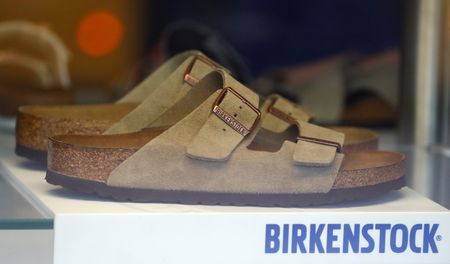KARLSRUHE, Germany (Reuters) – Birkenstock sandals, which have evolved from a symbol of counterculture to a trendy fashion item, do not qualify as art and are therefore not protected by copyright, Germany’s highest civil court ruled on Thursday.
The Federal Court of Justice dismissed a lawsuit brought by the German company, which had sought to prevent competitors, such as Germany’s Tchibo, from selling similar models.
“The claims are unfounded because they (the sandals) are not copyright-protected works of applied art,” presiding judge Thomas Koch said.
Under German law, copyright protection is valid for 70 years after the creator’s death, while design protection hinges on the product’s lifespan and ends after 25 years.
The legal distinction between design and art in German law lies in a product’s purpose. Design serves a practical function while works of applied art require a discernible level of individual artistic creativity.
Shoemaker and Birkenstock dynasty member Karl Birkenstock, born in 1936, is alive. However, since he crafted his initial designs in the 1970s, some sandals no longer enjoy design protection.
As a result lawyers asked the court to classify the shoes as art.
Konstantin Wegner, Birkenstock’s lawyer, said the sandals had an “iconic design” and announced further litigation after the decision was announced. “We want to add arguments in these pending proceedings”, said Wegner without elaborating.
Once popular with hippies, tech enthusiasts and medical professionals, Birkenstock gained widespread attention after Australian actress Margot Robbie wore a pair of pink Birkenstocks in the final scene of the 2023 hit movie “Barbie”.
Founded in 1774, Birkenstock was run by the namesake family for six generations until it sold a majority stake to L Catterton, a U.S. private equity firm backed by French billionaire Bernard Arnault and his luxury goods empire LVMH.
L Catterton remained Birkenstock’s biggest shareholder after the company went public in 2023.
(Reporting by Ursula Knapp, writing by Thomas Seythal; Editing by Sharon Singleton)










